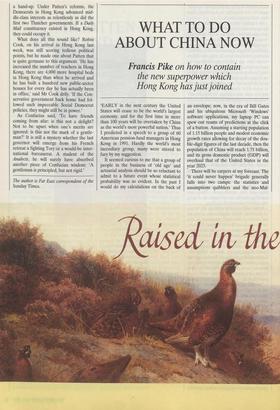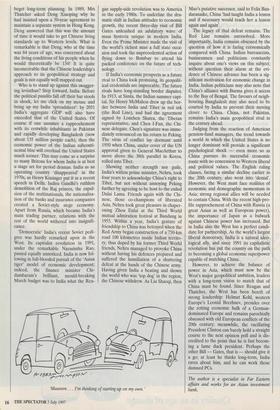WHAT TO DO ABOUT CHINA NOW
Francis Pike on how to contain the new superpower which Hong Kong has just joined `EARLY in the next century the United States will cease to be the world's largest economy, and for the first time in more than 100 years will be overtaken by China as the world's most powerful nation.' Thus I predicted in a speech to a group of 60 American pension-fund managers in Hong Kong in 1991. Hardly the world's most incendiary group, many were stirred to fury by my suggestion.
It seemed curious to me that a group of people in the business of 'old age' and actuarial analysis should be so reluctant to admit to a future event whose statistical probability was so evident. In the past I would do my calculations on the back of an envelope; now, in the era of Bill Gates and his ubiquitous Microsoft 'Windows' software applications, my laptop PC can spew out reams of predictions at the click of a button. Assuming a starting population of 1.15 billion people and modest economic growth rates allowing for decay of the dou- ble-digit figures of the last decade, then the population of China will reach 1.75 billion, and its gross domestic product (GDP) will overhaul that of the United States in the year 2023.
There will be carpers at my forecast. The `it could never happen' brigade generally falls into two camps: the statistics and assumptions quibblers and the neo-Mal- thusians. Indeed, there are too many vari- ables to make it likely that any personal computer prediction on the crossover date will be accurate. However, the broad trend of the statistics is clear. The combination of demographics and growth from a low level of GDP per capita makes it inevitable that the total size of the Chinese economy will overtake that of the United States, even if American citizens remain individu- ally richer than their Asian counterparts. As for the neo-Malthusians, they find it inconceivable that China alone could add more than one billion people to its existing population by the end of the next century, believing that a new disease will emerge to wipe out the excess populations of Third World countries. The doomsters may be right, but 'end of the world' scenarios usu- ally command long odds.
Such scepticism is not new. In the 1950s, Norman Macrae, writing for the Econo- mist, faced derision when he forecast that the Japanese economy (then half the size of the United Kingdom's) would overtake Britain. Japan is now four times bigger! Indeed, it may well be that my forecast for China underestimates the speed at which America will be overtaken. After all, on the World Bank's estimate of aggregate GDP using a purchasing power parity cal- culation, China is already the world's third largest economy. Taking a simple econom- ic aggregate approach to the growth of China's power is to underestimate the scope of the Chinese world. Singapore is a great offshore Chinese banking centre, while Taiwan, the Kuomintang hideaway, is a rapidly growing US $300 billion econ- omy which China is now looking to embrace. As for Myanmar and North Korea, these are already China's client states. Leaving aside newly acquired Hong Kong, a minority Chinese diaspora con- trols the economies of Thailand, Malaysia and Indonesia. The world's most rapidly growing region is already in thrall to the Chinese.
Moreover, unlike America, China's political system is clearly geared to mili- taristic pursuits. China's recently deceased paramount leader, Deng Xiaoping, held just one official post, vice-chairman of the Military Commission. Deng's interest in the army was more than symbolic. A veter- an of the long march, he was one of Mao's most accomplished military leaders. Mao once remarked pointedly to Khrushchev that the little man (Deng) had defeated a million of Chiang Kai-shek's finest sol- diers. One of Deng's first acts, after oust- ing Mao's successor, Hua Guofeng, was to restore ranks to a Chinese army ravaged by the cultural revolution. By 1980 China was also equipped with ICBMs with a 7,000-mile delivery which brought Ameri- ca into range. With 107 submarines, China now has the world's third largest fleet. Moreover, Deng skilfully integrated the army into the new enterprise culture which has transformed the Chinese economy, and in doing so made the military leadership important stakeholders.
As for regional ambitions, the thrust of China's policy is clear — to be the regional superpower. Ancient themes recur in Chi- nese history: just as Mao saw himself as another in a long line of peasant leaders who had seized the 'Mandate from Heav- en' to become Emperor, so the idea of China as the 'Middle Kingdom' remains intact today. As we have seen with China's claim to the Spratly Islands, also claimed by Vietnam and the Philippines, the Chi- nese are happy to play the role of regional bully. Chinese expansionism may also reflect China's concerns about its economic vulnerability; her billion or so people have just 240 million acres of arable land com- pared to the 400 million acres hogged by America's 240 million people.
On a more prosaic level, China has yet to restore all its borders. Hong Kong and soon Macao may be restored to their right- ful position, but Taiwan, a harder nut to crack, is sure to be the centre of China's political and militaristic focus for the fore- seeable future. On this point, one would not like to bet against China. Chinese lead- ers read their history books and treat bygone humiliations (e.g., the Opium Wars) as today's insults. Long memories beget long-term planning. In 1989, Mrs Thatcher asked Deng Xiaoping why he had insisted upon a 50-year agreement to maintain a separate system in Hong Kong. Deng answered that this was the amount of time it would take to get Chinese living standards up to Western levels. What is remarkable is that Deng, who at the time was 84 years of age, was concerned about the living conditions of his people when he would theoretically be 134! It is quite inconceivable that the Chinese leadership's approach to its geopolitical strategy and goals is not equally well mapped out.
Who is to stand up against this swagger- ing leviathan? Step forward, India. Before the political pundits fall off their bar stools in shock, let me click on my mouse and bring up my India 'spreadsheet': by 2051 India's aggregate GDP will also have exceeded that of the United States. Of course if one assumes a rapprochement with its erstwhile inhabitants in Pakistan and rapidly developing Bangladesh (now about 135 million people each), then the economic power of the Indian subconti- nental bloc will overhaul the United States much sooner. This may come as a surprise to many Britons for whom India is at best a stage set for period dramas. India as an operating country 'disappeared' in the 1970s, as Henry Kissinger put it in a recent speech in Delhi. Indira Gandhi's ruthless demolition of the Raj princes, the expul- sion of the multinationals, the nationalisa- tion of the banks and insurance companies created a Soviet-style siege economy. Apart from Russia, which became India's main trading partner, relations with the rest of the world withered into insignifi- cance.
`Democratic' India's recent Soviet pedi- gree was hardly remarked upon in the West. Its capitalist revolution in 1991, under the remarkable Narasimha Rao, passed equally unnoticed. India is now fol- lowing in full-blooded pursuit of the 'Asian tiger' model of economic development; indeed, the finance minister Chi- dambaram's brilliant, mould-breaking March budget was to India what the Rea- gan supply-side revolution was to America in the early 1980s. To underline the dra- matic shift in Indian attitudes to economic growth, the recent three-day visit of Bill Gates unleashed an adulatory wave of mass hysteria unique in modern India. Even the Prime Minister made the visit of the world's richest man a full state occa- sion and took the unprecedented action of flying down to Bombay to attend his packed conference on the future of tech- nology.
If India's economic prospects as a future rival to China look promising, its geopolit- ical credentials are impeccable. The future rivals have long-standing border disputes. In 1913, at Simla, the Indian summer capi- tal, Sir Henry McMahon drew up the bor- der between India and Tibet in red ink (the Red Line), and had the agreement signed by Lonchen Shatra, the Tibetan representative, and Chen I-Fan, the Chi- nese delegate. Chen's signature was imme- diately renounced on his return to Peking. The virus of conflict lay dormant until 1950 when China, under cover of the UN approval given to General MacArthur to move above the 38th parallel in Korea, rolled into Tibet.
Showing neither strength nor guile, India's witless prime minister, Nehru, took four years to acknowledge China's right to Tibet, but not without annoying Peking further by agreeing to be host to the exiled Dalai Lama. Friends again with the Chi- nese, those co-champions of liberated Asia, Nehru took great pleasure in chaper- oning Zhou Enlai at the Third World mutual admiration festival at Bandung in 1955. Within a year, India's gesture of friendship to China was betrayed when the Red Army began construction of a 750-km road 100 kilometres inside Indian territo- ry; thus duped by his former Third World friends, Nehru managed to provoke China without having his defences prepared and suffered the humiliation of a shattering defeat at the hands of the Chinese army. Having given India a beating and shown the world who was lop dog' in the region, the Chinese withdrew. As Liu Shaoqi, then `Maureen . . . I'm thinking of starting up on my own.' Mao's putative successor, said to Felix Ban- daranaike, China 'had taught India a lesson and if necessary would teach her a lesson again and again'.
The legacy of that defeat remains. The Red Line remains unresolved. More importantly, India remains obsessed by the question of how it is faring economically compared with China. Indian bureaucrats, businessmen and politicians constantly inquire about one's views on this subject; without question their alarm at the evi- dence of Chinese advance has been a sig- nificant motivation for economic change in India. Indian politicians may also note that China's alliance with Burma gives it access to the Bay of Bengal. The favours of neigh- bouring. Bangladesh may also need to be courted by India to prevent their moving closer to China. China, not Pakistan, remains India's main geopolitical rival in the century ahead.
Judging from the reaction of American pension-fund managers, the trend towards a world in which the United States is no longer dominant will provide a significant psychological shock — even more so as China pursues its successful economic route with no concession to Western liberal and political values. The English ruling classes, facing a similar decline earlier in the 20th century, also went into 'denial'. However, the West must face realities of economic and demographic momentum in Asia; strong regional allies will be needed to contain China. With the recent high-pro- file rapprochement of China with Russia (a great Asian as well as European power), the importance of Japan as a bulwark against Chinese power has increased. But in India also the West has a perfect candi- date for partnership. As the world's largest liberal democracy, India is a natural ideo- logical ally, and since 1991 its capitalistic revolution has put the country on the path to becoming a global economic superpower capable of matching China.
However, to achieve the balance of power in Asia, which must now be the West's major geopolitical ambition, leaders with a long-term vision to match that of China must be found. Since Reagan and Thatcher, the West has been bereft of strong leadership: Helmut Kohl, western Europe's Leonid Brezhnev, presides over the rotting economic hulk of a German- dominated Europe and remains parochially obsessed with old European conflicts of the 20th century; meanwhile, the vacillating President Clinton can barely hold a straight course to the next opinion poll and is dis- credited to the point that he is fast becom- ing a lame duck president. Perhaps the other Bill — Gates, that is — should give it a go; at least he thinks long-term, India raves about him, and he can work those damned PCs.
The author is a specialist in Far Eastern affairs and works for an Asian investment bank




























































 Previous page
Previous page